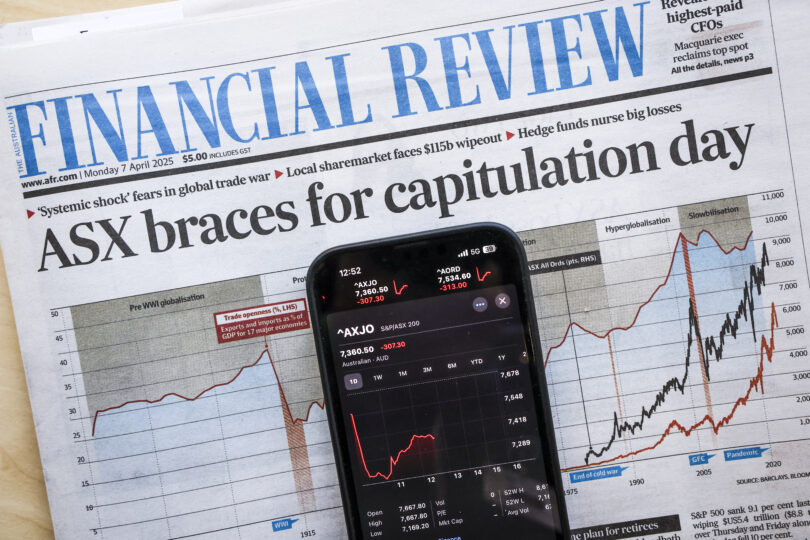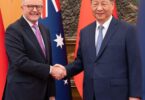Australian Stocks Plunge $160 Billion Amid Trade War Fears, Dollar Tanks
Business News Roundup/Market update
Sydney,14.00 hours,07 April,2025
*This article containing leading news content condensed, summarised and formatted with Gemini AI
The Australian stock market experienced a dramatic opening on Monday, with over $160 billion wiped off share values as escalating trade war tensions between the US and China triggered a sharp sell-off. The benchmark S&P/ASX 200 index plummeted by 6% within minutes of trading, revisiting levels not seen since late 2023, before recovering slightly to close down approximately 4%.
The market’s initial dive sent shockwaves through investment and superannuation portfolios, intensifying losses incurred following recent US tariff announcements.
“It’s a bloodbath on the share market today in Australia,” remarked Luke McMillan, head of research at Ophir Asset Management, drawing parallels to the market turbulence during the COVID-19 pandemic and the global financial crisis. He emphasized the unique nature of this downturn, largely attributed to “one person, essentially – the US president.”
Across the ASX, major sectors experienced significant declines, with banking, mining, and energy stocks particularly hard-hit. Commonwealth Bank and BHP shares both fell by over 5%. Despite a midday partial recovery, the day’s total stock market losses remained substantial, hovering around $100 billion. This mirrored a volatile day on Wall Street, where futures also rebounded after earlier steep declines.
The looming implementation of China’s 34% retaliatory tariffs on US imports has fueled concerns of a “full-blown trade war” and an imminent global recession, according to market analyst Tony Sycamore of IG Australia. Australia’s close economic ties with China have made its market especially sensitive to these trade disputes.
_________________________________________________________
Drammatic Quote from a report in Sydney Morning Herald 07 April,2025
“More than $85 billion has been wiped off the value of Australian shares in a dramatic market plunge, with share prices of corporate giants collapsing in response to the escalating trade war between the United States and China.
The ASX 200 was 3.8 per cent lower at midday, after being down more than 6 per cent in early trade after a dramatic plunge on Wall Street over the weekend. All sectors of the market are deep in the red, while the Australian dollar has also slipped under US60¢.
Banks, miners and energy companies were hit the hardest, as all sectors opened sharply lower, with the biggest stock on the ASX, Commonwealth Bank, tanking 5 per cent. Other banks also plunged, with ANZ 5.1 per cent lower, Westpac shedding 4 per cent and NAB down 3.8 per cent.
Mining giants BHP plunged 5.8 per cent and Rio Tinto dropped 4.2 per cent, while oil and gas giants Woodside fell 7.3 per cent after more declines in the global oil price. Santos lost 9.6 per cent.”
______________________________________________________________
Adding to the economic strain, the Australian dollar plummeted to its lowest level against the US dollar since April 2020, briefly dipping below 60 US cents.
This decline is attributed to the dollar’s correlation with commodity prices, particularly iron ore, which are expected to suffer in a global economic slowdown.
The Australian dollar also saw significant drops against the Euro, British pound, and other Asian currencies.
Economist My Bui from AMP highlighted the correlation between the global demand for Australian commodities, like Iron Ore, and the worries of a global trade war and overall economic downturn.







